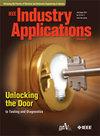Dynamic Stability Analysis of a Simplified Neuro-Fuzzy Direct Torque Control Scheme for a Grid-Connected DFIG-WECS With Improved Performance and Reduced Computation
IF 4.2
2区 工程技术
Q2 ENGINEERING, ELECTRICAL & ELECTRONIC
引用次数: 0
Abstract
This paper presents a simplified neuro-fuzzy torque control (NFTC) scheme for a grid-connected doubly fed induction generator (DFIG) with enhanced stability while reducing the computational burden. The proposed NFTC scheme processes the torque and flux errors between the actual torque and flux and their respective references to produce switching signals to the Rotor Side Converter (RSC). Furthermore, the NF structures utilized by the proposed NFTC scheme are more simplified as they consider single input to generate control signal. A systematic analysis related to the computational burden of the NF networks is performed to prove the reduced computation related to proposed NFTC. A hybrid training algorithm is also developed to train the parameters of the proposed NF structures based on the data obtained from the classical PI controller incorporating system uncertainties. The stability analysis of the WECS incorporating the proposed NFTC scheme is accomplished by estimating the system to a second order linear time invariant system. Furthermore, the trajectories of generator torque and flux are analyzed considering grid voltage fluctuation to verify the global stability of the WECS. The performance of the NFTC is investigated in simulation using MATLAB-Simulink at various operating conditions such as wind speed change and grid voltage variations. The efficacy of the NFTC is also verified experimentally using laboratory prototype and DSP board DS1104. Both simulation and real-time results confirm the satisfactory performance of the proposed NFTC scheme.针对并网 DFIG-WECS 的简化神经模糊直接转矩控制方案的动态稳定性分析,提高性能并减少计算量
本文针对并网双馈感应发电机(DFIG)提出了一种简化的神经模糊转矩控制(NFTC)方案,在增强稳定性的同时减轻了计算负担。拟议的 NFTC 方案处理实际转矩和磁通与各自参考值之间的转矩和磁通误差,为转子侧转换器(RSC)生成开关信号。此外,拟议的 NFTC 方案所使用的 NF 结构更加简化,因为它们只需考虑单输入即可生成控制信号。我们对 NF 网络的计算负担进行了系统分析,以证明拟议的 NFTC 减少了计算量。此外,还开发了一种混合训练算法,用于根据从包含系统不确定性的经典 PI 控制器获得的数据训练所提议的 NF 结构的参数。通过将系统估算为二阶线性时不变系统,完成了采用拟议 NFTC 方案的 WECS 的稳定性分析。此外,考虑到电网电压波动,还分析了发电机转矩和磁通的轨迹,以验证 WECS 的全局稳定性。在风速变化和电网电压变化等各种运行条件下,使用 MATLAB-Simulink 对 NFTC 的性能进行了仿真研究。此外,还使用实验室原型和 DSP 板 DS1104 对 NFTC 的功效进行了实验验证。模拟和实时结果都证实了所提出的 NFTC 方案性能令人满意。
本文章由计算机程序翻译,如有差异,请以英文原文为准。
求助全文
约1分钟内获得全文
求助全文
来源期刊

IEEE Transactions on Industry Applications
工程技术-工程:电子与电气
CiteScore
9.90
自引率
9.10%
发文量
747
审稿时长
3.3 months
期刊介绍:
The scope of the IEEE Transactions on Industry Applications includes all scope items of the IEEE Industry Applications Society, that is, the advancement of the theory and practice of electrical and electronic engineering in the development, design, manufacture, and application of electrical systems, apparatus, devices, and controls to the processes and equipment of industry and commerce; the promotion of safe, reliable, and economic installations; industry leadership in energy conservation and environmental, health, and safety issues; the creation of voluntary engineering standards and recommended practices; and the professional development of its membership.
 求助内容:
求助内容: 应助结果提醒方式:
应助结果提醒方式:


